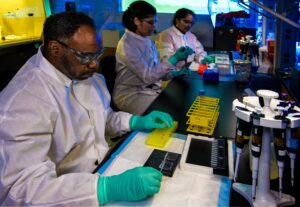Why is SciComm important?

At every career level, and no matter who your audience, science communication is an essential tool. What is compelling about your research, why should it matter to others, and how can you convey that to someone else?
Whether you are speaking with fellow researchers, science policymakers, community stakeholders, or the general public, being able to effectively convey an understanding of your work is integral to its success.
Communication between researchers and the public is incredibly important to the progress of science and society as a whole, but there is significant evidence of the disconnect between scientists and non-scientists, and even between scientists of divergent fields. The rampant spread of misinformation over social media is a symptom of this situation, and recent events have made this divide more apparent than ever.

Science communication serves as a way to bridge this gap and bring to the public a greater understanding of the science that impacts their daily lives. It can also help researchers work together across fields to collaborate and conduct interdisciplinary and convergent research–methods that are critical to solving the dynamic challenges of our times. Effective science communication is also integral to increasing diversity in STEM, which furthers public trust in research when communities see themselves reflected in the science community.
For your own career, communication skills are key for networking, job applications and furthering your research program. This toolkit was designed by STEM graduate students (with help and input from STEM undergrads) to provide you with tools to hone your science communication skills at every level. It will provide guidance and resources for communicating your research to all of the audiences previously mentioned. We hope you find it useful, and that you will share with others.
How to use this toolkit:
This toolkit is divided into four buckets corresponding to different areas of science communication, each with its own set of goals, resources, tips, and tools to help you communicate your science to groups of all backgrounds and in all situations. Please check out the resources and come back as needed.
- Professional Communication
- Media Engagement
- Community Outreach
- Promoting Diversity, Equity, and Inclusion
If you are looking for resources on career development or job application materials, please visit the GC’s Office of Career Planning & Professional Development website for further information. For more general writing tips, consult the GC’s Writing Center.
If you are interested in learning more about careers in science communication, check out the AAAS media fellowships, the National Association of Science Writers, and the Council for the Advancement of Science Writing.


